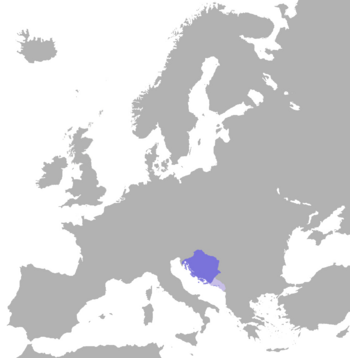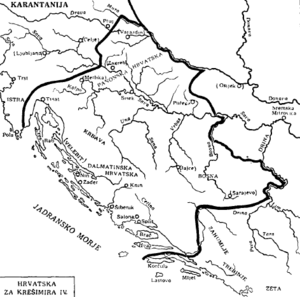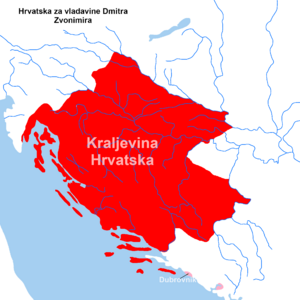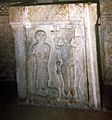Kingdom of Croatia (medieval) facts for kids
Quick facts for kids
Kingdom of Croatia
Kraljevina Hrvatska
|
|||||||||||
|---|---|---|---|---|---|---|---|---|---|---|---|
| c. 925–1102 | |||||||||||

Croatia at the height of its power
|
|||||||||||
| Capital | Varied through time Nin Biograd Solin Knin |
||||||||||
| Common languages | Old Croatian, Latin | ||||||||||
| Religion | Roman Catholicism | ||||||||||
| Government | Feudal Monarchy | ||||||||||
| King | |||||||||||
|
• 925–928
|
Tomislav (first) | ||||||||||
|
• 1093–1097
|
Petar Svačić (last) | ||||||||||
| Ban (Viceroy) | |||||||||||
|
• c. 949–969
|
Pribina (first) | ||||||||||
|
• c. 1075–1091
|
Petar Svačić (last) | ||||||||||
| Historical era | Middle Ages | ||||||||||
|
• Elevation to kingdom
|
c. 925 | ||||||||||
| 1102 | |||||||||||
| Area | |||||||||||
| 110,000 km2 (42,000 sq mi) | |||||||||||
| ISO 3166 code | HR | ||||||||||
|
|||||||||||
The Kingdom of Croatia was a medieval country in Central Europe. It covered most of what is now Croatia and much of modern-day Bosnia and Herzegovina. This kingdom was a sovereign state for almost 200 years, ruled by local families.
Contents
Early History of the Croats
The Slavic people arrived in the area that is now Croatia in the early 7th century. There are no written records from that time about their arrival. Historians rely on stories written much later, which might be based on old spoken traditions.
The Croats were a Slavic tribe. They came from an area in or near modern-day Poland or western Ukraine. Many experts believe that early Croats were farmers. They were likely ruled by the Alans, who were nomadic people speaking an Iranian language.
Life in the Kingdom
The Kingdom of Croatia had many conflicts. It also had times of peace and alliances with other groups. These included the Bulgarians, Byzantines, and Hungarians. Croatia also competed with Venice for control of the eastern Adriatic coast.
An important person was Gregory of Nin, a bishop in the 10th century. He wanted to use the Croatian language in church services. This caused disagreements with the Pope.
Golden Age of Croatia
In the second half of the 11th century, Croatia became very strong. It took control of most coastal cities in Dalmatia. This happened as the Byzantine Empire's power there weakened.
The kingdom was at its strongest under kings Peter Krešimir IV (1058–1074) and Demetrius Zvonimir (1075–1089).
End of the Kingdom
The Trpimirović dynasty mostly ruled the state until 1091. After that, there was a problem with who would be the next king. This led to ten years of fighting for the throne.
After the Battle of Gvozd Mountain, the crown went to the Árpád dynasty from Hungary. King Coloman of Hungary was crowned "King of Croatia and Dalmatia" in Biograd in 1102. This event joined the two kingdoms under one ruler.
Images for kids
-
Croatia on a map of southeastern Europe in 1045
See also
 In Spanish: Reino de Croacia para niños
In Spanish: Reino de Croacia para niños









